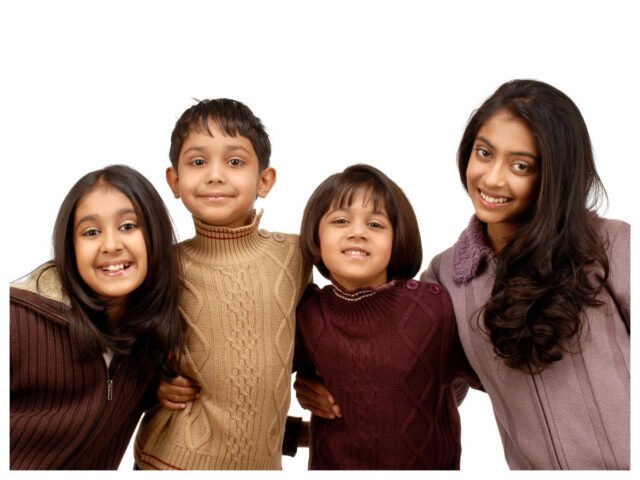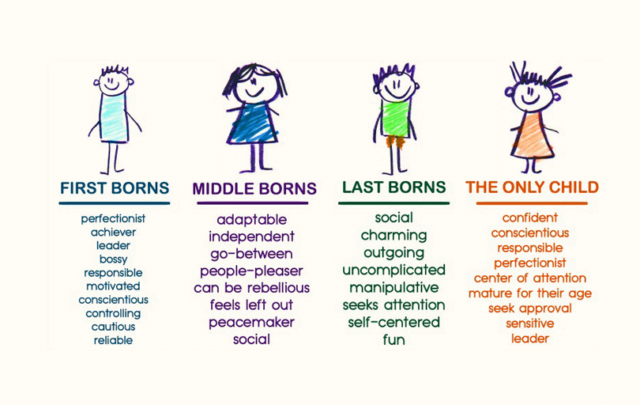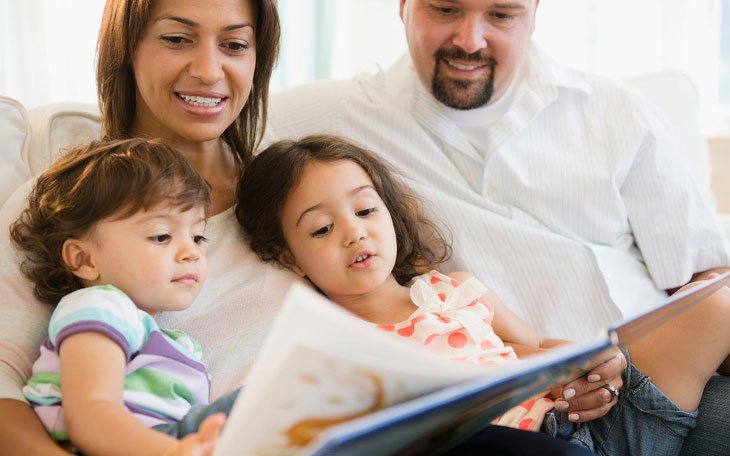Despite sharing genes and environments, siblings are often not as similar as one might think. But where do the supposed differences come from?

Every child occupies a certain niche within the family and then uses his or her strategies to master life. Birth order refers to the order in which you were born among your siblings. Many believe that the order in which you were born among brothers and sisters influences how you develop.
Alfred Adler (1870–1937), an Austrian psychiatrist, and a contemporary of Sigmund Freud and Carl Jung was one of the first theorists to suggest that birth order influences personality. He argued that birth order can leave an indelible impression on an individual’s style of life, which is one’s habitual way of dealing with the tasks of friendship, love, and work.

The First Born/The Leaders:
A firstborn is naturally raised with a mixture of ‘instinct’ and ‘trial-and-error’. This often causes parents to be extremely attentive, stringent with rules, and overly neurotic about the minutiae. Research suggests that this, in turn, may cause the child to become a perfectionist, always striving to please their parents.
The firstborn is accustomed to being the center of attention; they have the parents to themselves before siblings arrive. That undivided attention may have a lot to do with why firstborns tend to be overachievers. The firstborn often benefit emotionally from this experience and emerges with a sense of security and self-confidence.
Firstborns are often given a lot of responsibility at home—whether it’s helping with chores or watching over younger siblings—they can be quick to take charge (and can be bossy when they do). Unfortunately, that burden can lead to excess stress for a child who already feels pressure to be perfect.
They are usually reliable, conscientious, structured, cautious, controlling, and achievers. On the other hand, oldest children tend to act like a second parent to their younger sibling, causing them to become protective and responsible.

The Middle Born/Second-Born/Peace-Makers:
If a couple decides to have a second child, they might raise their second-born with less pressure due to their previous experience. They might also be less attentive since there are other children in their lives.
Therefore, analyzing research, and psychometric tests that are done in the past, the middle child is often a people-pleaser due to the lack of attention they get in comparison to older siblings and younger siblings.
Because they receive less attention at home, middle-borns tend to forge stronger bonds with friends and be less tethered to their family than their brothers and sisters.
Middleborns are go-with-the-flow types; once a younger sibling arrives, they must learn how to constantly negotiate and compromise to “fit in” with everyone. In general, middle children tend to possess the following birth order personality traits – they are people-pleasers, who thrive on friendships, have a large social circle, and are peacemakers.
The middle child may feel they have to compete for their parent’s attention. They often create their niche, something unique to excel at that is different from their siblings.
Also Read: Here’s Why Empaths And Narcissists Are Attracted To Each Other

The Youngest Born/Last Born/Fun-Loving:
The youngest children tend to be the most free-spirited due to their parents’ increasingly laissez-faire attitude towards parenting the second (or third, or fourth, or fifth) time around. Youngest also make a play for the spotlight with their adventurousness.
Free-spirited lastborns are more open to unconventional experiences and taking physical risks than their siblings. None of their accomplishments seem original. Their siblings have already learned to talk, read, and ride a bike.
So parents react with less spontaneous joy at their accomplishments. According to further research on Alfred Adler’s works the baby of the family tends to have the following birth order traits – they are fun-loving, uncomplicated, manipulative, outgoing, attention-seekers, and self-centered.

The Only Child/ Perfectionists:
Being the only child is a unique position. Without any siblings to compete with, the only child monopolizes his parents’ attention and resources—not just for a short period like a firstborn, but forever.
In effect, this makes an only child something like a “super-firstborn”: only children have the privilege (and the burden) of having all their parents’ support and expectations on their shoulders.
Thus, only children tend to be mature for their age, perfectionists, conscientious, diligent, and leader-like. Only children are typically surrounded by adults, so they tend to be independent, confident, and intelligent. They have a lot in common with firstborn children, although they often are more creative yet less agreeable than those with siblings are.
It is not just the number (where you are in the numerical birth order) that matters but also the way that the child interprets personality. It is believed that it is possible to identify with more than one birth order category.
After all, every firstborn child has been the only child at one point, and middle children were once the youngest. The gap in years between children can also have an impact. But there is no hard data on birth order, that will have a lasting effect on your personality.
Age, mindset, circumstances, and birth order play their respective roles in the making of individual identity, thus everyone is unique. These are some research-based findings and not facts, and thus are open to interpretation.
Do let us know in the comment section if you found your traits right!
Image Credit: Google Images
Sources: TOI, PNAS, ResearchGate
Find The Blogger: @saba_kaila0801
This post is tagged under: Birth Order, Personality, Traits, Family, parenting, Parents, Mindset, Firstborn, second born, youngest, only child, Psychology, Alfred Adler, Characteristics, first-borns are the teachers, later-borns are the learners, not facts, research, research blogs, Caring, loving, achievers, fun-loving, dependents, family, family values


































